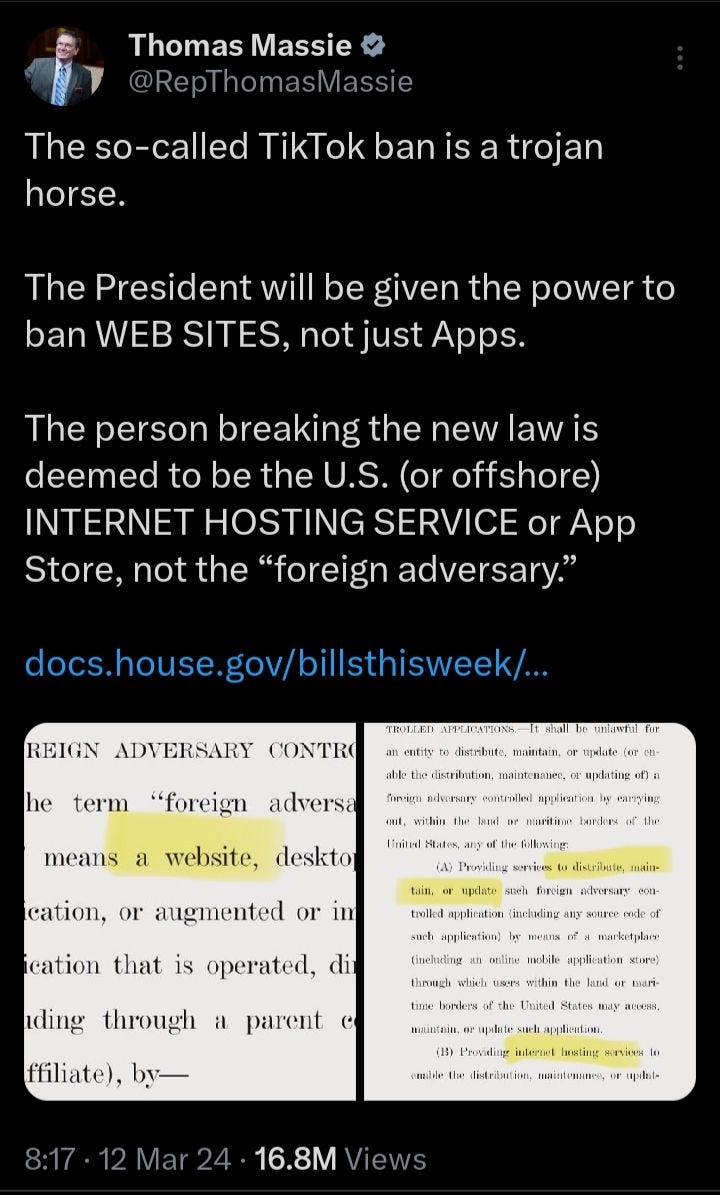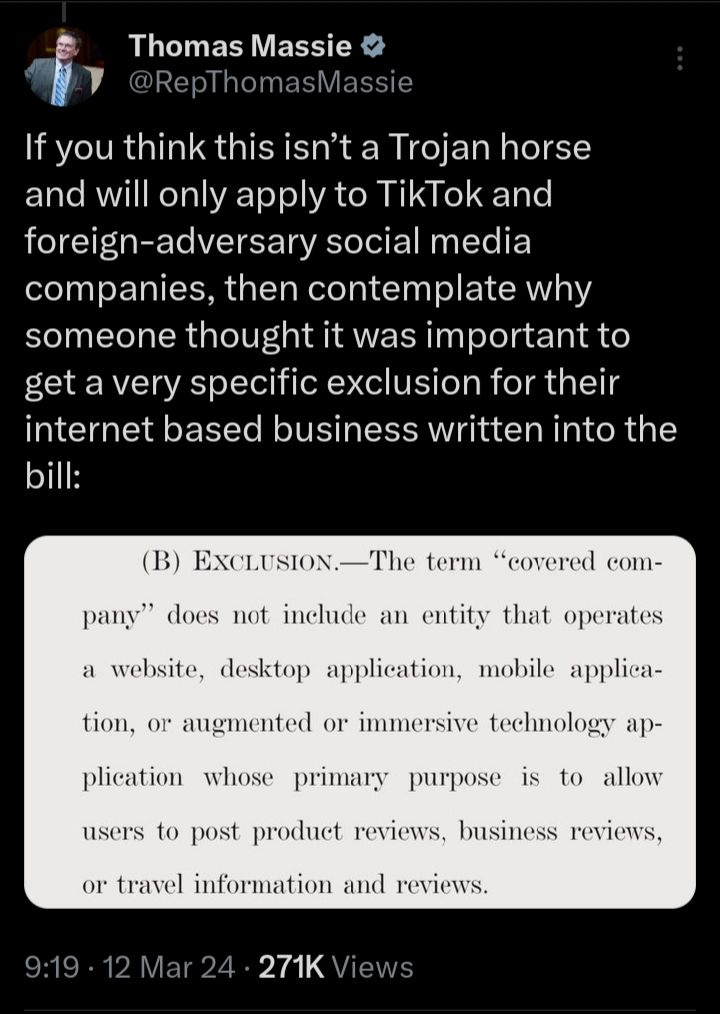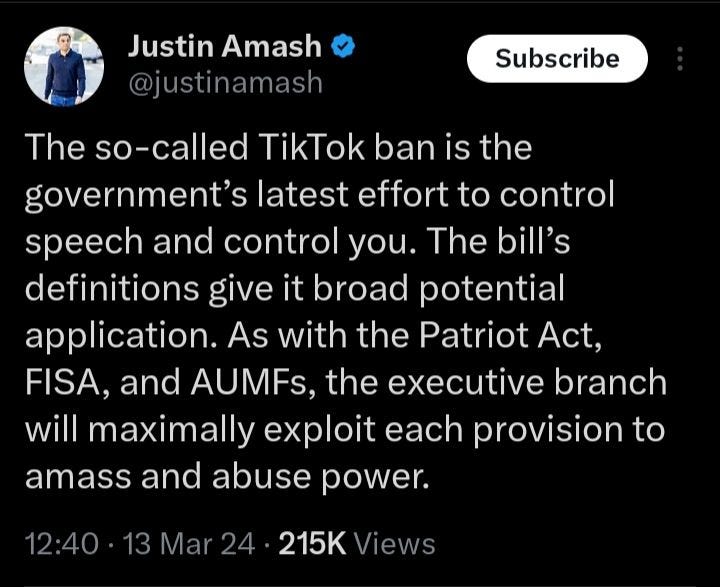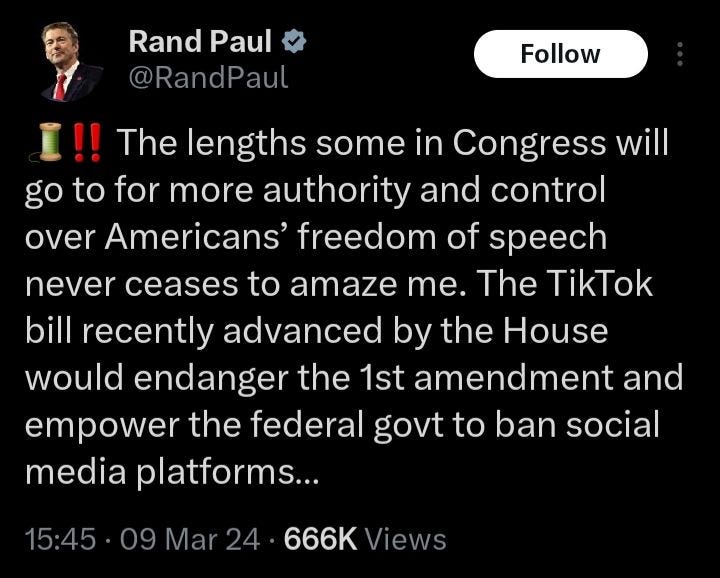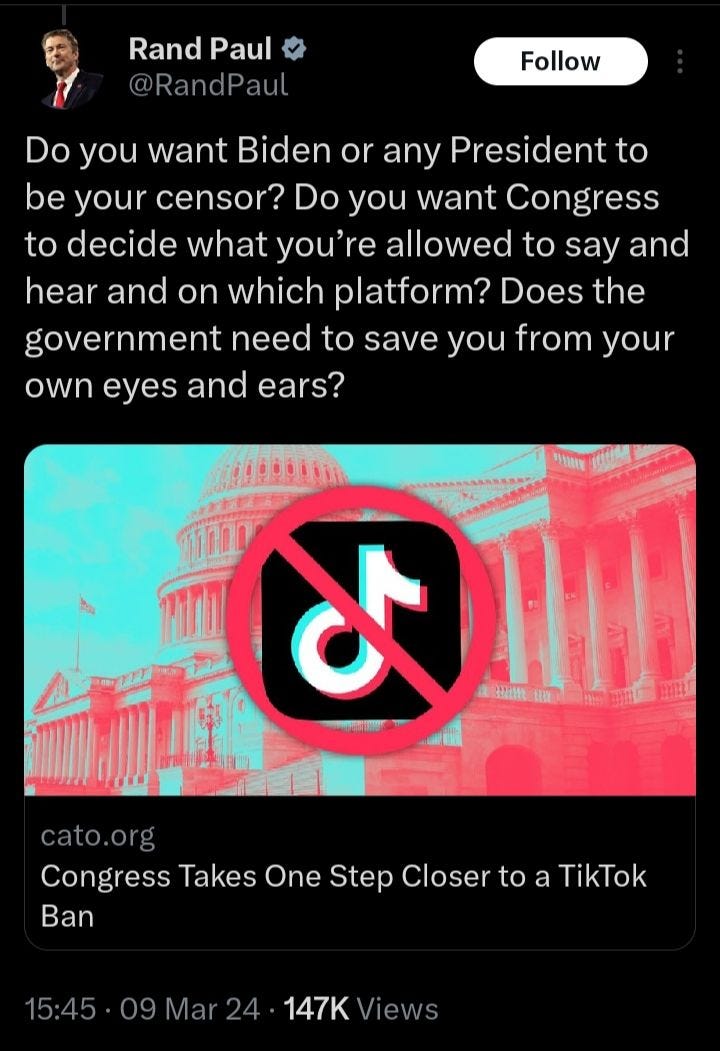TikTok Ban A “Trojan Horse” For Censorship
Despite feigning concerns over the privacy and safety of Americans, the real reason the government is vying to ban TikTok is far more authoritarian.
By Don Via Jr.
(The Rundown Live)
Anytime there is a bipartisan consensus on a piece of legislation making its way through Congress, Americans should be doubly concerned about exactly what that legislation actually does.
The reason for this is that during this day and age of political theater, smoke and mirrors, controlled opposition chicanery and the like reinforcing the tribalism’s of the fake left versus right dichotomy, anytime the oligarchy is actually united on a certain front you can rest assured that behind whatever manufactured crisis or phony narrative they are propagating is an ulterior motive that only goes to serve in the benefit of the predator class.
This is typically the case throughout recent American history often with the passage of and subsequent renewals of things such as 2001’s Patriot Act, or the yearly reauthorization of the illegal warrantless mass surveillance programs through acts such as the NDAA, and previously proposed legislation that has since failed such as the 2021 For The People Act; a dubious bill disguised as a voting rights law but which actually restricted voter choice by suppressing independent and third party candidates.
They are at it again.
On March 13th the US House of Representatives passed a 352 to 65 vote, with overwhelming bipartisan support, in favor of the Protecting Americans from Foreign Adversary Controlled Applications Act (HR 7521) in a bid to force the social media app TikTok to divest from its Chinese parent company ByteDance within six months or otherwise face a nationwide ban.
This isn’t the first time that the establishment has come after the newly created social media platform which soared in popularity during the pandemic. Last March Congress tried and thankfully failed to pass the Orwellian Restricting the Emergence of Security Threats that Risk Information and Communications Technology Act, or RESTRICT Act.
Floating under a similar guise as the current TikTok ban, the bill served effectively as a digital iron curtain giving the federal government sweeping powers of surveillance and censorship while feigning concerns about protecting Americans privacy.
Writing about the RESTRICT Act at the time, The Free Thought Project’s editor-in-chief Matt Agorist had this to say;
Make no mistake, this piece of legislation is the “Patriot Act on steroids.” The RESTRICT Act would seemingly grant the US government total control over all devices connected to the internet, including cars, Ring cameras, refrigerators, Alexa devices, and your phone. It goes beyond the pale, with the end goal being nothing short of a complete invasion of your privacy.
Under the guise of national security, the RESTRICT Act targets not only TikTok but all hardware, software, and mobile apps used by more than one million people. This means that anything from your Google Home device to your smartphone could be subject to government monitoring and control.
Similarly, the current push to do away with the app isn’t much different.
Characterized as a “power grab for the deep state”, while elaborating upon the dubious and vague nature of the legislation independent journalist Michael Tracey notes:
Another provision authorizes the President, who is currently Joe Biden and may soon be Donald Trump, to make unilateral determinations about whether certain applications “present a significant threat to the national security of the United States,” and therefore must be banned like TikTok. The criteria for making such a determination is left conspicuously vague.
So if you really want to give Biden or Trump more unilateral power to control the proliferation of content online, this appears to be just the bill for you.
He further charges that the bill effectively violates the First Amendment rights of over 150 million Americans, both children and adults, who use the app not only as a mechanism for the expression of their speech, and to engage with the free speech of others, but also as a means of consuming information, which is protected under the First Amendment clause of freedom of press.
Tracey also took aim at the obscure usage of “protecting national security” and classified hearings as a means of fast tracking the legislation, as these excuses have often been utilized to make ulterior motives more ambiguous. Stating —
If the case for banning TikTok advanced by the “Intelligence Community” is so airtight and worthy of instant unanimous approval, they should disclose the supporting evidence. Otherwise the public’s only option is to credulously accept subjective, questionably-motivated claims of unknown “Intelligence Community” operators who purport to assess a “national security” threat posed by Communist-controlled teenage dance videos. Before rashly ejecting up to 170 million American users from a top social media platform, partly based on evidence furnished in these secret Star Chamber proceedings, why not “de-classify” and release the relevant evidentiary material so the public can evaluate it for themselves? Why should informed democratic deliberations on the subject be reserved for those with specially-approved Security Clearances?
US Representative Thomas Massie (R-KY), one of the few to vote against the bill, took to Twitter to expose the bill as being a “Trojan horse” which gives the executive branch sweeping powers to censor the internet.
“Americans have the right to view information, we don’t need to be protected by the government from information.”
Speaking to Congress Massie lambasted the broadness of the bill and it’s open-endedness which leaves it ripe for abuse of power.
Among other legislators who have voiced concerns over the unconstitutional nature of the ban include former US Representative and current Senate candidate Justin Amash (L-MI), and Senator Rand Paul (R-KY), who have both called out the bill as a scheme to control and censor the speech of Americans.
The irony of the claims that the US government cares about the privacy of its citizens is palpable. While feigning concern over Chinese data mining, they continue to overtly allow big tech companies like Google and Meta to surveil and steal their users private data while Congress actively works to restrict encryption services that would protect Americans data.
Furthermore, despite the unsupported claims that TikTok is under control of a foreign adversary and poses a national security threat due to yet to be proven allegations that the app’s parent company shares user data with the Chinese government, the reality is almost exactly the opposite.
Over the last few years elements of the US national security state have been slowly infiltrating the company at high levels. A series of reports published by MintPress News has exposed that since partnering with the Texas based CIA-cutout company Oracle – where user data is actually stored, thus raising further scrutiny over the credibility of “data safety” claims – that the managerial ranks of TikTok have been filled with former employees of the Central Intelligence Agency and the US State Department hard at work attempting to control the flow of content and spread pro-US messaging on behalf of the establishment.
The fact that the intelligence community has worked so hard to infiltrate the upper echelons of TikTok only goes to further demonstrate the dangers posed in this most recent legislation if the US government is able to exert undue influence over TikTok the way it has with other big tech companies.
With regard to U.S. policy on social media, narrative control is a prominent factor. Though a largely unspoken element of this most recent attempt at banning TikTok, one of the driving reasons likely pushing for the ban is the US’s continued support for the ongoing genocide in Gaza. Unlike on other social media apps, raw news relaying the facts of Israel’s apartheid against the Palestinian people often go uncensored on TikTok, contributing to a shift in narrative among young people regarding public opinion on Israel compared to older generations.
This is made ever more apparent by recent statements by the lead sponsor of the bill, Wisconsin congressman Mike Gallagher, who urged the banning of TikTok implicitly because the app is “becoming the dominant news platform for Americans under 30”. Compounding this are statements by other prominent US representatives pushing for the TikTok ban who have openly voiced concerns of pro-Palestine content on the platform during congressional hearings with TikTok CEO Shou Zi Chew.
In February South Carolina Senator and notorious warhawk Lindsey Graham posited that TikTok was “being used to help people who want to destroy the Jewish state”. More recently Texas Senator Ted Cruz would allege, citing misleading data, that TikTok is “poisoning the minds of American children” by “promoting self harm and anti-Israel propaganda”.
In a recently leaked phone call pro Israel lobbyist Jonathan Greenblatt, also chairman of the Anti Defamation League (ADL), notorious for its suppression of critics of Israel, lamented that “We really have a TikTok problem“. Citing how the app is, in his words, responsible for spreading pro-Hamas propaganda and anti-Semitism. False accusations of anti-Semitism is a common tactic used by Zionists and Israel apologists attempting to divert away from the heinous crimes against humanity that Israel routinely commits. Meanwhile, pro-Israel lobbyists have applauded the House’s passage of the bill.
It’s quite clear that rather than simply being aimed at protecting the privacy of Americans from a foreign adversary, HR7521 serves as the latest draconian attempt to control what Americans see, hear, and think amid the ongoing information war.




